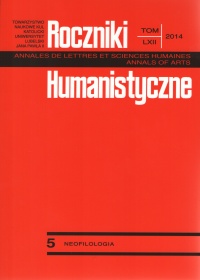Limitations on Zero Internal Arguments in Polish Verbal System: Transitives with Corresponding Derivatives in roz-
Abstract
The paper deals with the limitations on omitting internal arguments of roz- prefixed verbs in Polish. Various linguistic factors influencing the distribution of overt internal arguments are considered, such as specific structures rearranging valency, selectional restrictions of the relevant verbs, semantic frame membership, contextual considerations (anaphor, existential INIs), and the presence of a specific morphological exponent, out of which the last two will be shown to bear on the occurrence of zero arguments with roz- verbs. Among the prefixed verbs these with the causative meaning are accountable for on the basis of their morpho-syntactic structure, but the remaining ones constitute a mystery. For these verbs explanations proposing additional predicational structures are analyzed and discarded. Then we consider a proposal concerning the maximization of the event information, following Filip (2013). The proposal assumes the existence of a maximizing semantic operator which, among others, underlies the notion of perfectivity in Slavic languages. The operator may find its place in the lexical representation of roz- and account for the proposition’s reluctance to part with its internal argument.
References
Alexiadou, Artemis and EditDoron (2012). “The syntactic construction of two non-active voices: passive and middle.” Journal of Linguistics 48, 1: 1-34.
Embick, David (2009). Roots, states, and stative passives. Abstract for Root Workshop. Stuttgart: University of Stuttgart.
Filip, Hana (2013). Slavic aspect: A constantly moving goal. A paper presented at FDSL Conference. Leipzig.
Fillmore, Charles J. (1986). “Pragmatically Controlled Zero Anaphora.” BLS 12: 95–107.
Goldberg, Adele (2005). “Constructions, Lexical Semantics and the Correspondence Principle: Accounting for Generalizations and Subregularities in the Realization of Arguments.” In Nomi Erteschik-Shir and TovaRapoport (eds.). The Syntax of Aspect, 212–236. Oxford: Oxford University Press.
Goldberg, Adele (2006). Constructions at Work. Oxford: Oxford University Press.
Haspelmath, Martin (1993). “More on the typology of inchoative/causative verb alternations.” In Bernard Comrie and Maria Polinsky (eds.). Causatives and Transitivity. Studies in Language Companion. Series 23: 87–111.
Łazorczyk, Agnieszka (2010). Decomposing Slavic Aspect: The Role of Aspectual Morphology in Polish and Other Slavic Languages. Ms. University of Southern California.
Malicka-Kleparska, Anna (to appear). In search of causative structures in the root based morphology: a case of Polish roz-/roze- causatives.
Przepiórkowski, Adam, Mirosław Bańko, Rafał Górski, and Barbara Lewandowska-Tomaszczyk B. (eds.) (2012). Narodowy Korpus Języka Polskiego. Warszawa: Wydawnictwo Naukowe PWN.
Rappaport Hovav, Malka and Beth Levin (1998). “Building verb meaning.” In: Miriam Butt and Wilhelm Geuder (eds.). The Projection of Arguments: Lexical and Compositional Factors, 97–134. CSLI Publications.
Resnik, Philip Stuart (1993). Selection and Information: A Class-based Approach to Lexical Relationships. Philadelphia: University of Pennsylvania dissertation.
Resnik, Philip Stuart (1996). “Selectional Constraints: An Information-theoretic Model and its Computational Realization.” Cognition 61: 127–59.
Romanova, Eugenia (2007). Constructing perfectivity in Russian. Tromsø: University of Tromsø dissertation. Available at http:/hdl.handle.net/10037/904
Ruppenhofer, Josef and Laura Michaelis L. (to appear). Frames and the Interpretation on Omitted Arguments in English.
Slabakova, Roumyana (2003). “Semantic and Morphological Reflexes of Functional Categories: The Case of Telicity Marking in L2 Russian.” In Juana M. Liceras et al. (eds.). Proceedings of the 6th Generative Approaches to Second Language Acquisition Conference (GASLA 2002), 284–297. Somerville, MA: Cascadilla Proceedings Project.
Szymanek, Bogdan (2010). A Panorama of Polish Word-Formation. Lublin: Wydawnictwo KUL.
Willim, Ewa (2006). Event, individuation and countability. A study with special reference to English and Polish. Kraków: Jagiellonian University Press.
Copyright (c) 2014 Roczniki Humanistyczne

This work is licensed under a Creative Commons Attribution-NonCommercial-NoDerivatives 4.0 International License.





